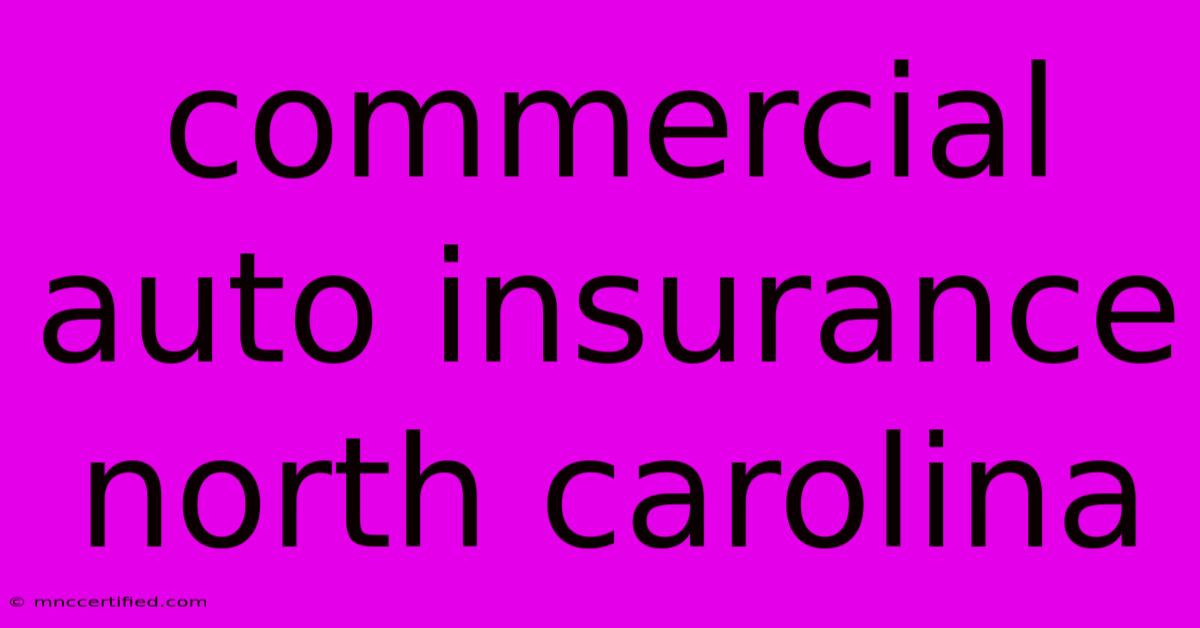Commercial Auto Insurance North Carolina

Table of Contents
Navigating the Roads of North Carolina: A Guide to Commercial Auto Insurance
Running a business in North Carolina often involves using vehicles for deliveries, service calls, or transporting employees. Whether you have a single truck or a fleet of vehicles, commercial auto insurance is a crucial part of protecting your business and your financial well-being. This comprehensive guide will equip you with the knowledge you need to understand the nuances of commercial auto insurance in North Carolina and choose the right coverage for your specific needs.
Understanding Commercial Auto Insurance in North Carolina
Commercial auto insurance differs from personal auto insurance in several important ways. While personal auto insurance covers private vehicles used for personal transportation, commercial auto insurance covers vehicles used for business purposes. This includes:
- Vehicles owned by the business: Trucks, vans, cars, and even motorcycles used for business operations.
- Leased or rented vehicles: If your business leases or rents vehicles for its operations.
- Vehicles driven by employees: Covering employees who use their personal vehicles for work-related purposes.
Key Coverage Options for North Carolina Businesses
Here are the essential types of coverage you should consider for your North Carolina commercial auto insurance:
1. Liability Coverage: This protects your business from financial losses if your vehicle is involved in an accident that causes injury or property damage to others. North Carolina requires all businesses to carry a minimum amount of liability coverage, which varies depending on the type of vehicle.
2. Collision Coverage: This covers damages to your vehicle caused by a collision, regardless of who is at fault.
3. Comprehensive Coverage: This protects your vehicle against damage from events other than collisions, such as theft, vandalism, fire, or natural disasters.
4. Uninsured/Underinsured Motorist Coverage: This protects you if you're involved in an accident with a driver who doesn't have sufficient insurance or is uninsured.
5. Medical Payments Coverage: This helps cover the medical expenses of your employees or yourself if you are injured in an accident, regardless of who is at fault.
6. Personal Injury Protection (PIP): This coverage pays for medical expenses and lost wages for you and your passengers, regardless of fault.
7. Cargo Coverage: If your business transports goods, cargo coverage protects your merchandise in case of loss or damage during transit.
8. Hired and Non-Owned Auto Coverage: This covers your business if an employee uses their personal vehicle for work-related purposes and is involved in an accident.
Choosing the Right Coverage
Determining the right commercial auto insurance policy for your business involves several factors:
- Type of business: The nature of your business and the types of vehicles you use heavily influence your coverage needs.
- Number of vehicles: If you operate a fleet of vehicles, you'll likely need a more comprehensive policy.
- Risk profile: The frequency and severity of accidents involving your vehicles determine your insurance premiums.
- Budget: Balance your coverage needs with your budget constraints.
Tips for Getting the Best Rates
- Maintain a good driving record: Minimize traffic violations and accidents.
- Implement safety programs: Develop and implement safety protocols for your employees.
- Shop around for quotes: Compare quotes from several insurance companies to find the best rates.
- Bundle policies: Combine your commercial auto insurance with other business insurance policies.
Navigating the North Carolina Insurance Landscape
- North Carolina Department of Insurance: The department regulates insurance companies and can assist with resolving complaints or issues.
- North Carolina Rate Bureau: This non-profit organization provides data and analysis to insurers, helping to determine fair rates.
- Independent insurance agents: Local agents can provide guidance and tailored advice on choosing the right commercial auto insurance.
Important Note: This article provides general information and should not be considered legal or financial advice. Contact a qualified insurance professional in North Carolina for personalized guidance on your specific insurance needs.

Thank you for visiting our website wich cover about Commercial Auto Insurance North Carolina. We hope the information provided has been useful to you. Feel free to contact us if you have any questions or need further assistance. See you next time and dont miss to bookmark.
Featured Posts
-
Day Of The Jackal What Changes In The Adaptation
Nov 08, 2024
-
Genesis Medical Group Insurance Accepted
Nov 08, 2024
-
Will Health Insurance Cover Wisdom Teeth
Nov 08, 2024
-
Day Of The Jackal Remake What You Need To Know
Nov 08, 2024
-
Smile Direct Club Cost Without Insurance
Nov 08, 2024